Items
Subject is exactly
Government Federal
-
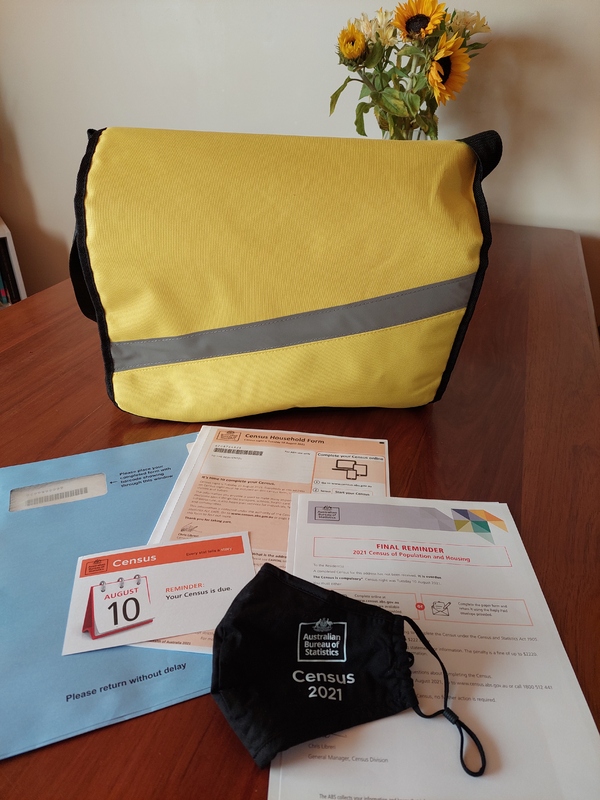 2021-09-10
2021-09-10Australian Census Materials
The Australian Census was conducted when many people and cities were in Lockdown. This changed the nature of Census work. No longer door knocking, workers were required to drop of census materials and reminders in keeping with 2021 contactless procedures. I wasn't allowed to doorknock but had to use intercoms for large apartment buildings. We were given masks and bright yellow satchels to carry materials. -
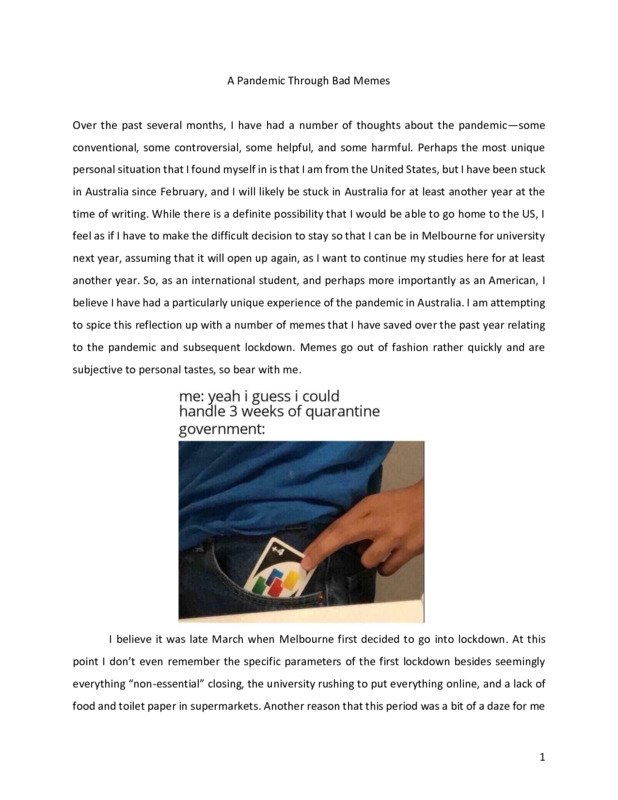 2020-10-17
2020-10-17A Pandemic Through Bad Memes
HIST30060, this is a personal text reflection on my experience in the pandemic complemented by internet memes -
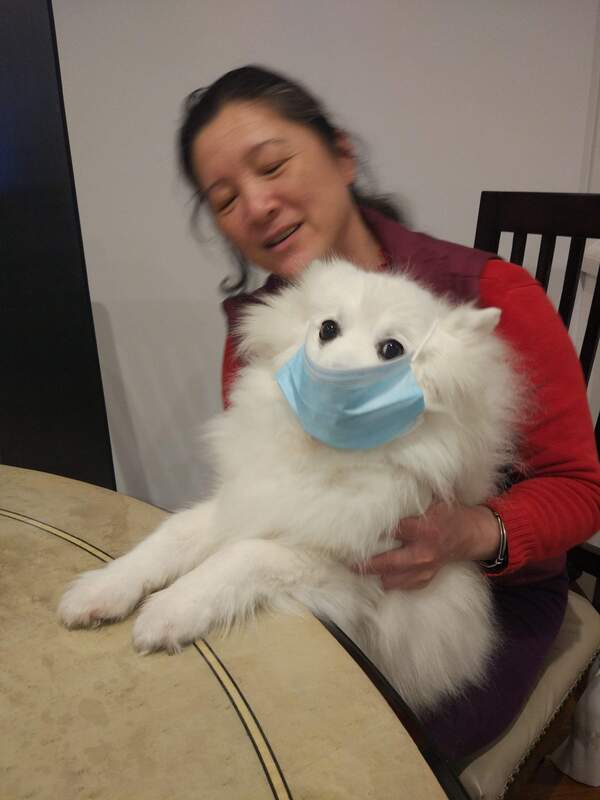 2020-08-07
2020-08-07Everyone Needs a Mask!
My mum sent me this very adorable photo of my dog wearing a face mask to gently remind me to wear a mask while in public to keep me safe from COVID-19. In Victoria, masks have been mandated in all public areas since July, regardless of social distancing. My mum sent this photo to some of our friends and family too, to cheer them up during the difficult times Victoria was going through at the time with a strong rise in cases. She had also reminded me, like with how our dog Snowy was wearing it in the photo, to make to cover both the mouth and the nose for the mask to function properly. Snowy did not much like wearing the mask, but he certainly looked extremely cute in it! Although at the time when my mum sent me this picture she had meant it as a joke, unfortunately with the new strain of the COVID mutation rumouring to originate from minks in Denmark, the possibility of dogs or cats contracting COVID-19 perhaps isn't so far-fetched. Remember to wear a mask and stay safe! -
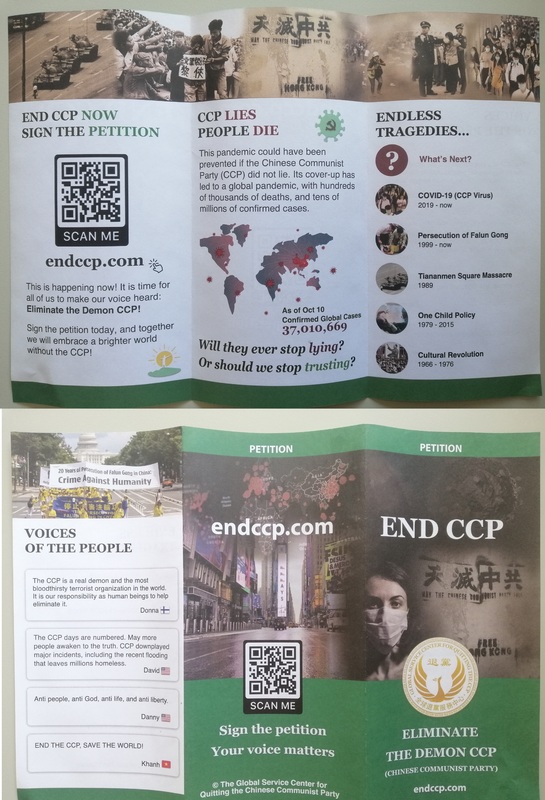 2020-11-09
2020-11-09Pamphlet blaming the CCP for COVID-19
This is a pamphlet I got in my mailbox from the Global Service Centre for Ending the Chinese Communist Party, inside which describes many of the 'evils' of the CCP including malicious negligence in the spread of COVID-19. It was quite unusual for me to receive this in my mailbox, I'm assuming since it was not a posted letter it was simply dropped off to many houses in my neighbourhood. The writing in it is quite sensationalistic, and was clearly extremely critical of the Chinese Communist Party. A lot of information and misinformation has been spread regarding the origins and handling of COVID-19, and much of it relies on fear and distrust to propagate. -
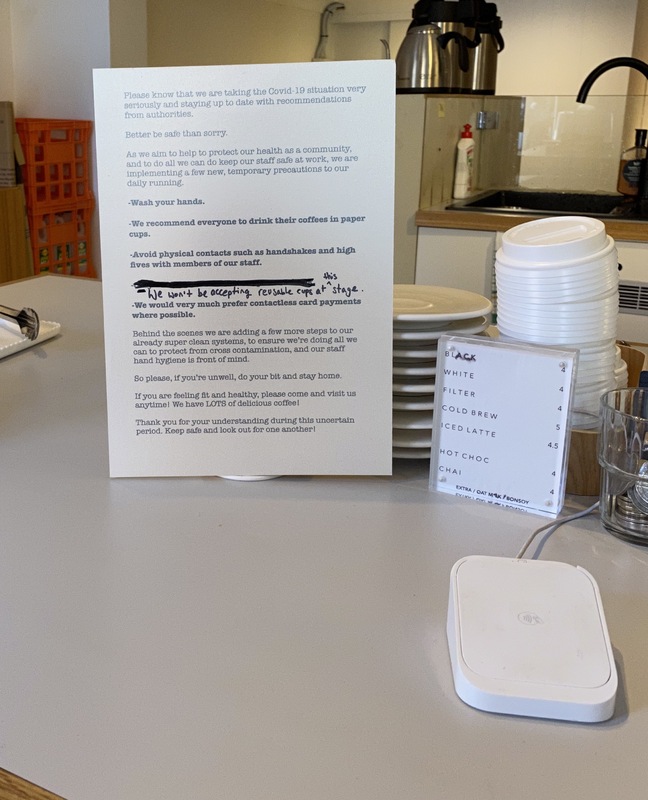 2020
2020The Warning Signs
While COVID-19 restrictions became part of the everyday, it was at times difficult to keep track of their constant changes and revisions. Businesses started to put up signs outlining their policies for staff and clients to keep everyone safe. The first image is from a cafe in Potts Point, one of many local businesses put under strain by the pandemic. The second is from an aged-care facility in Woollahra in response to the beginning of the second-wave outbreak in Melbourne. -
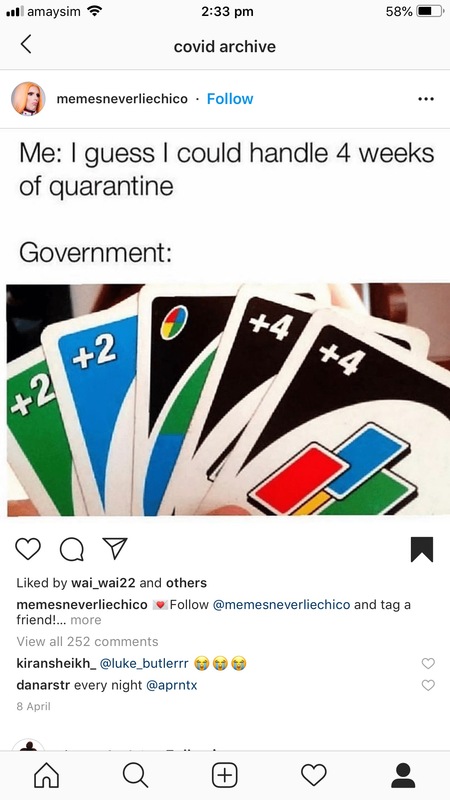 2020-04-08
2020-04-08(HIST30060) lockdown lasting much longer than two weeks
Back at the start of the pandemic, everyone thought we would locked down and at home for about 2 weeks, and then things would start getting back to normal. Little did we know that 9 months down the track would countries still be going into lockdowns and others having lighter restrictions. As the weeks went on and the case numbers kept rising, the level of restrictions increased as did the number of weeks we were in lockdown (Melbourne is just now slowly coming out of a 15 week lockdown, one of the longest in the world). -
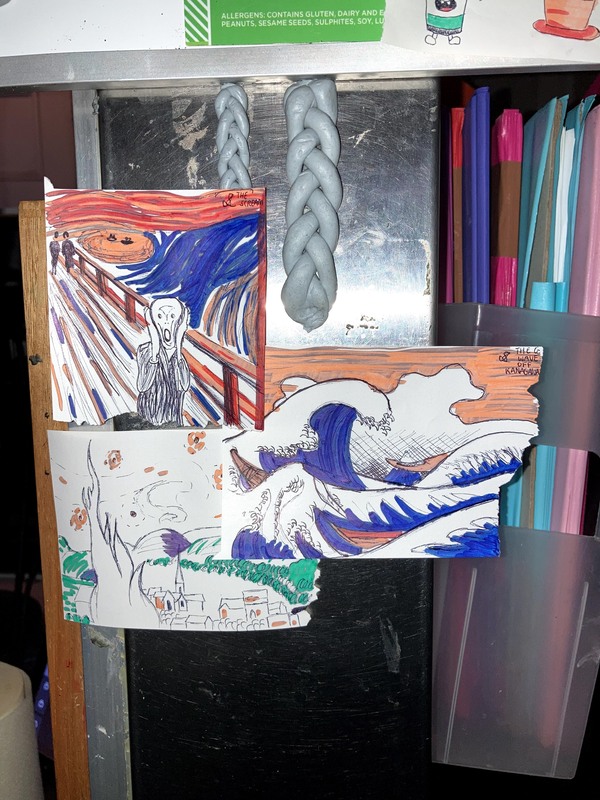 2020-07-03
2020-07-03Filling the time whilst working in fast food
HIST30060 During this year, I was luck enough to still be able to work in my fast food job due to the JobKeeper program, which saw the government paying the wages of part time and full time staff, as well as certain casuals. I would work 2 to 3 shifts a week in the city, which allowed me time to get out of the house and socialise with my coworkers. Restrictions meant we did not receive many customers, with our main source of income coming from the delivery platforms my boss installed. Despite this work, it did not mean I was able to escape the boredom most faced during the prolonged periods of restrictions, as there is only so much cleaning you can do in the periods where we had no customers. To fill the time, I began recreating famous paintings I could find online in miniature form, using the materials I could find in store, such as white board markers and receipt paper. Pictured here is my attempt at recreating Vincent Van Gogh’s ‘Starry Night’ (bottom left), the ‘Great Wave off Kanagawa’ by Hokusai (right), and Edvard Munch’s ‘The Scream’ (top left). -
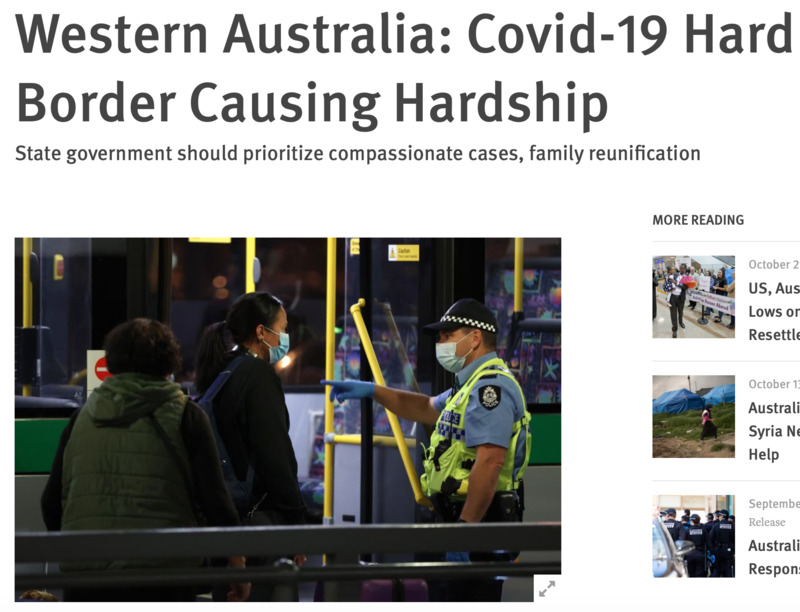 2020-10-28
2020-10-28Western Australia's Hard Border
Western Australia's "Hard Border" has prevented many people who live in the state from returning home. Australians wishing to enter the state must apply for travel approval called the “Good to Go process” with the police. Very few are permitted to enter, and those that do must also self-quarantine for 14 days. -
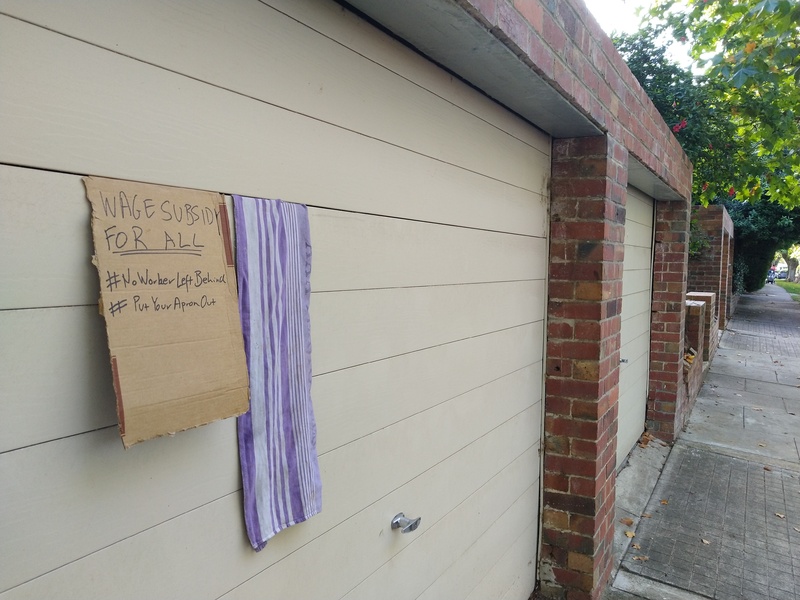 2020-04-08
2020-04-08At-Home Union Action
Text reads: WAGE SUBSIDY FOR ALL #NoWorkerLeftBehind #PutYourApronOut Trade unions were strong advocates for a more robust safety net for workers who had lost their jobs owing to the pandemic. The JobKeeper package left behind casual workers (like me) and workers on temporary visas who were already had the most insecure labour conditions. My union shifted online. We ran social media campaigns, online pickets, and a whole range of other digital actions. Unfortunately, this one didn't get up. LNP stuck to their guns of looking after wealthy, white folk. Typical... HIST30060 -
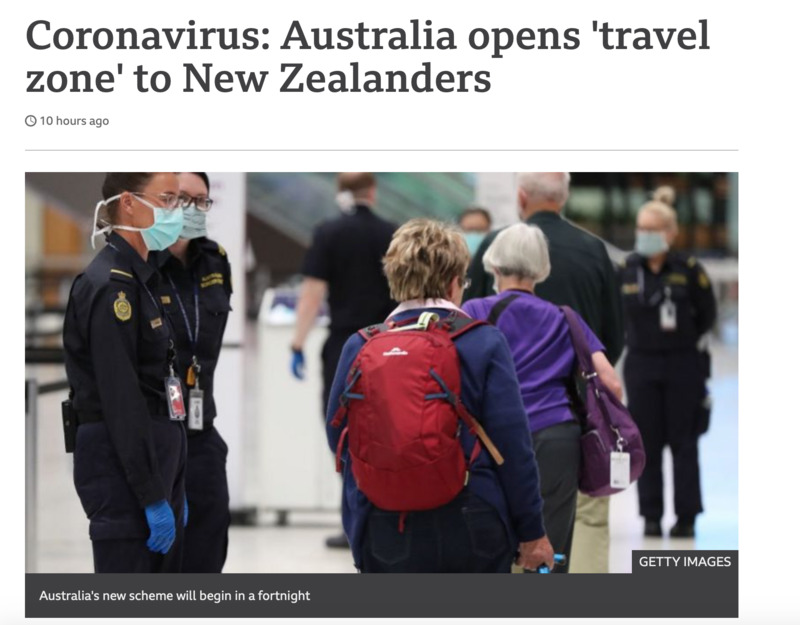 2020-10-02
2020-10-02Travel bubble between New Zealand Australia soon to open
Because both New Zealand and Australia have both handled the pandemic well, with no current outbreaks, they are opening up the Trans-Tasman Travel area up again. They are hoping this can help boost the economies of both countries hard-hit tourism industries. -
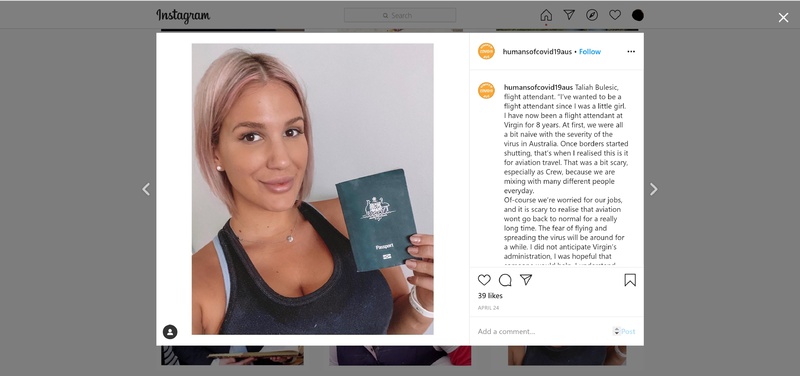 2020-04-24
2020-04-24Humans of Covid-19 AU: Taliah Bulesic
“I’ve wanted to be a flight attendant since I was a little girl. I have now been a flight attendant at Virgin for 8 years. At first, we were all a bit naive with the severity of the virus in Australia. Once borders started shutting, that’s when I realised this is it for aviation travel. That was a bit scary, especially as Crew, because we are mixing with many different people everyday. Of-course we’re worried for our jobs, and it is scary to realise that aviation wont go back to normal for a really long time. The fear of flying and spreading the virus will be around for a while. I did not anticipate Virgin’s administration, I was hopeful that someone would help. I understand why the Government said no to a bail out. They are doing what they can, but it was disappointing from a staff perspective to not see help come through. The culture at Virgin is something I've never experienced before. It is different from other airlines. We’ve all come together and really supported each other, which has helped with the mental health of many staff. Everyone is very optimistic, and our CEO is confident we will be able to get out of this. There’s a real never giving up attitude. I never thought I would live to see something like this. You have days when you get upset, ‘a selfish moment’, when you think about your life and how it has changed. But I try to educate myself about what else is going on around the world, and it makes me appreciate where we are. I love flying, but I've stuck it out for 8 years because of who I work for. I think it would be a huge culture shock moving airlines, and it won’t happen anytime soon. But who knows, maybe one day - aviation is in your blood.” Instagram post on Taliah Bulesic, flight attendant, and her experience during the pandemic, which was created by a psychology student living in Melbourne who was interested to hear about how COVID-19 was impacting on different peoples’ lives. -
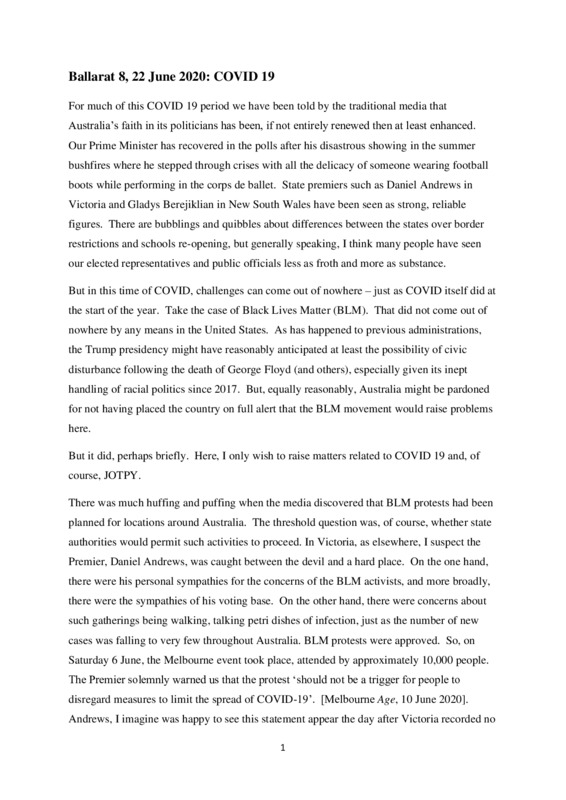 2020-06-22
2020-06-22Protest in a time of epidemic. Ballarat 8, 22 June 2020
The problems of how to permit political protest when an epidemic is present in your society - the BLM issue -
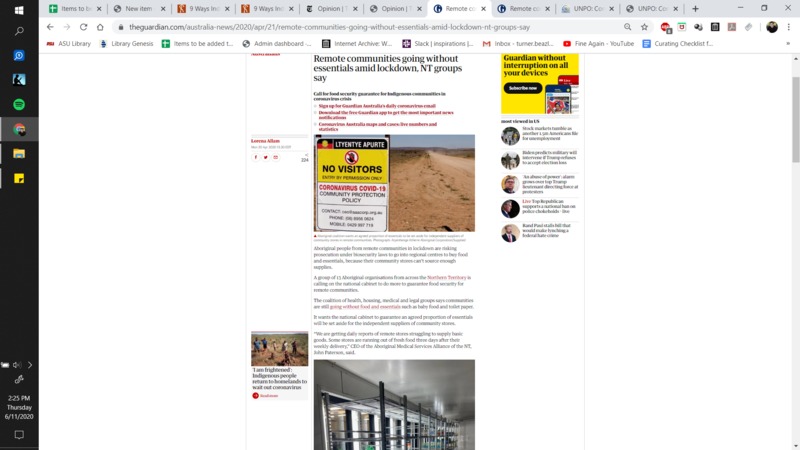 2020-04-20
2020-04-20Remote Australian Indigenous Communities Going Without Essentials Amid Lockdown
“Aboriginal people from remote communities in lockdown are risking prosecution under biosecurity laws to go into regional centres to buy food and essentials, because their community stores can’t source enough supplies. A group of 13 Aboriginal organisations from across the Northern Territory is calling on the national cabinet to do more to guarantee food security for remote communities.” -
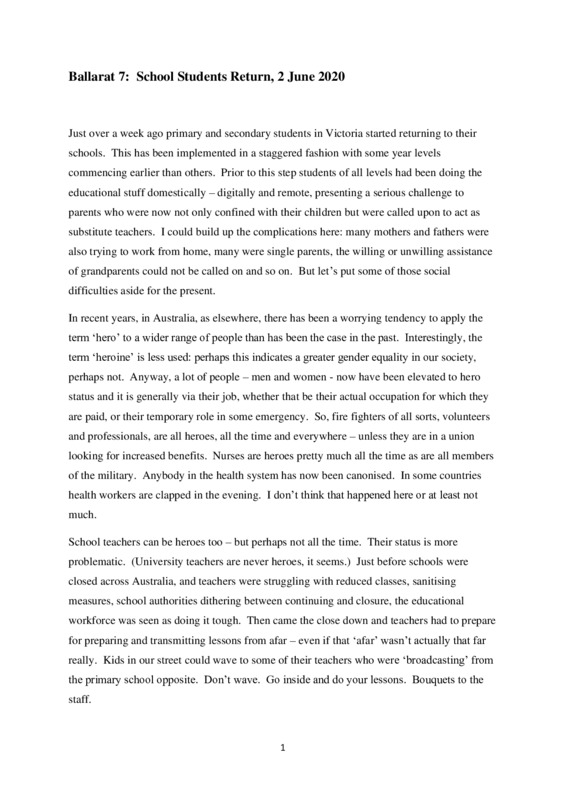 2020-06-02
2020-06-02Ballarat 7: Students Return to School
I have provided hopefully some personal insights into how school teachers have been perceived while schools have been closed and recently re-opened in Victoria. -
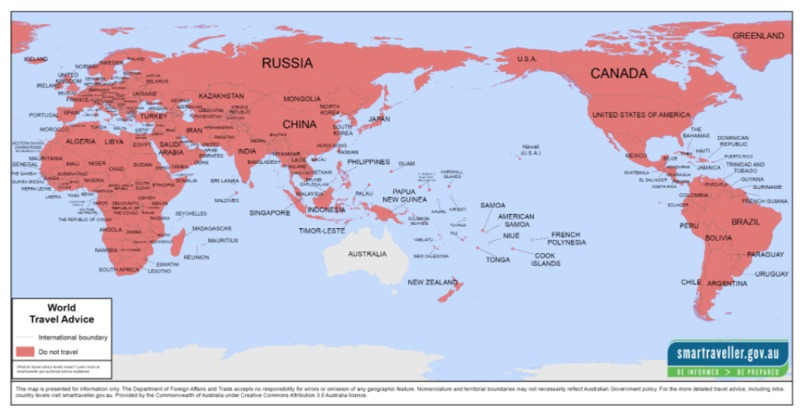 04/08/2020
04/08/2020Australian 'Smart Traveller' World Travel Advisory Map
SmartTraveller is the Australian Government's travel advisory website. This may be a historical first: every continent on the SmartTraveller map is red. The government's official advice is 'Do Not Travel' for everywhere in the world. It's a striking visual that sums up the universality of the pandemic experience. -
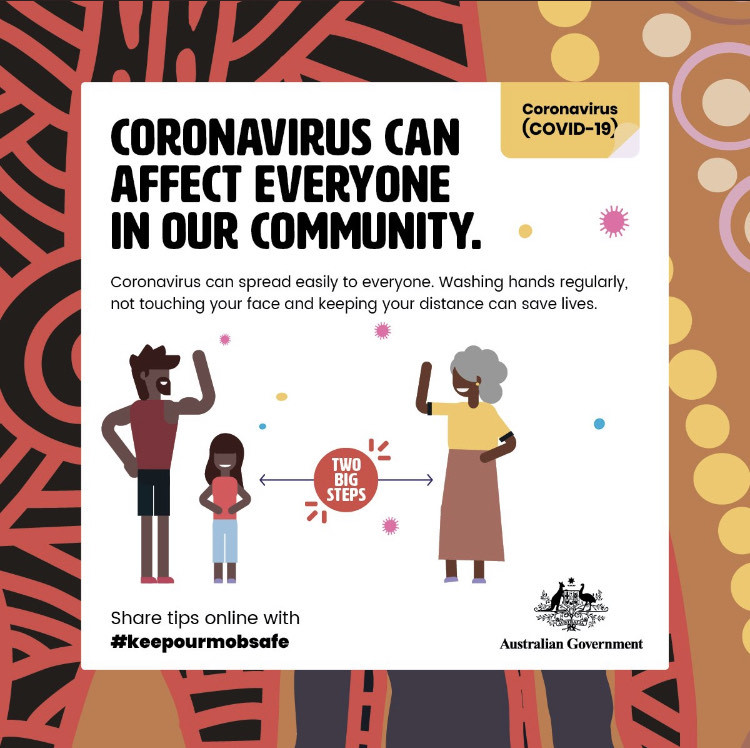 2020-05-17
2020-05-17#KeepOurMobSafe Campaign
The Australian Government has launched a campaign to #keepourmobsafe. This image is of a screenshot of an ad for the campaign, which the government is using to educate Indigenous Australians of the risk of Covid-19. The ads appear to be targeting Indigenous Australians living in remote communities, giving them tips on how to stop the spread of Covid-19. The campaign utilises indigenous artwork and slang to appear 'relatable'. -
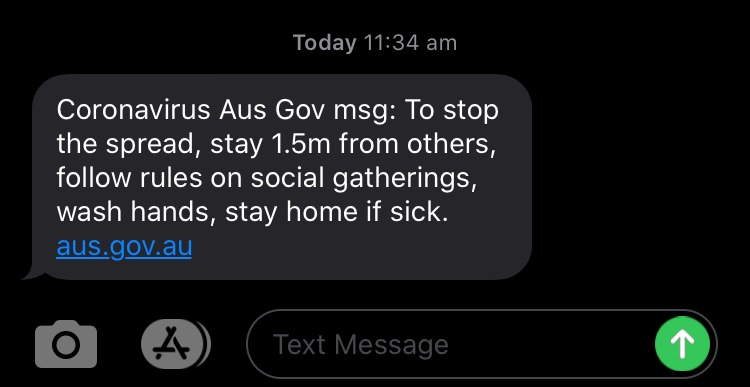 2020-03-25
2020-03-25Australian Government formal COVID-19 mass text alert
The Australian Government sent out a very curt mass text on the 25th of March to warn Australian citizens to follow COVID-19 guidelines. I chose this item because the timing and brevity was viewed by many as 'too little, too late'. It's a reflection of the fact that it took our government a week or two to absorb and act on the seriousness of the situation - not long before this message came out, the Prime Minister had still been encouraging people to attend football matches in high-capacity stadiums. Though the government eventually recognised the risk, and acted more decisively than some other countries, a large chunk of credit must go to Australians with the foresight to begin acting in advance of government instruction. By the time I received this message, my workplace had already been shut down to a work-from-home situation for a full two weeks, and the University of Tasmania's campuses had been shut down for five days. (HUM404) -
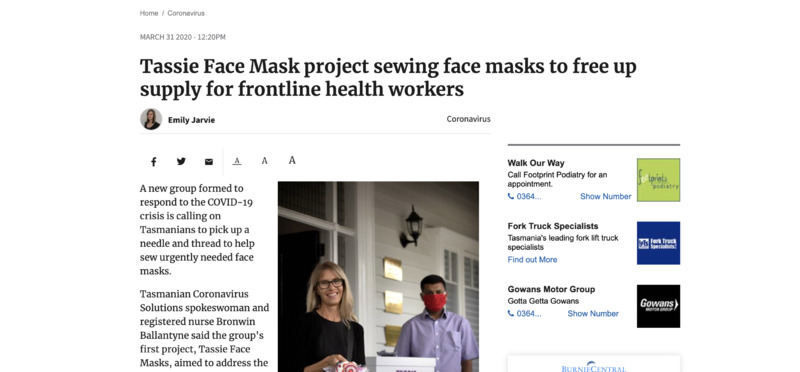 2020-03-31
2020-03-31Tassie Face Mask Project
HUM402 The local community getting together for positive action against COVID-19. By sewing masks it's giving the broader community an active way to be involved as well as reducing stress on the low stocks of protective equipment. -
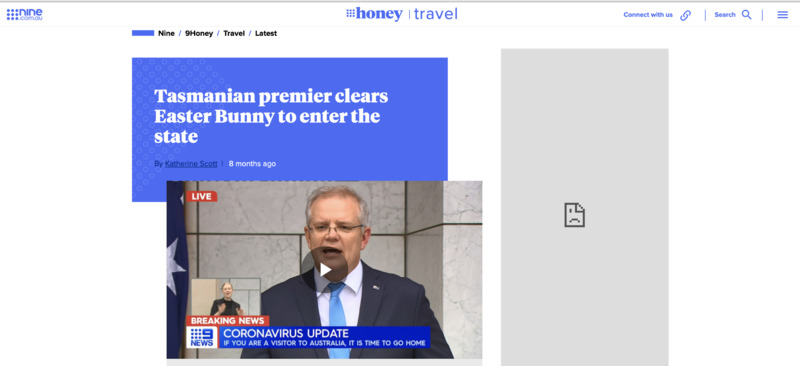 2020-04-06
2020-04-06Tasmanian premier clears Easter Bunny to enter the state
HUM402 A light-hearted gesture to combat all of the negative news and loss of a traditional Easter holiday for many. Even though travel was prohibited, Easter egg hunts were still something to be looked forward to. -
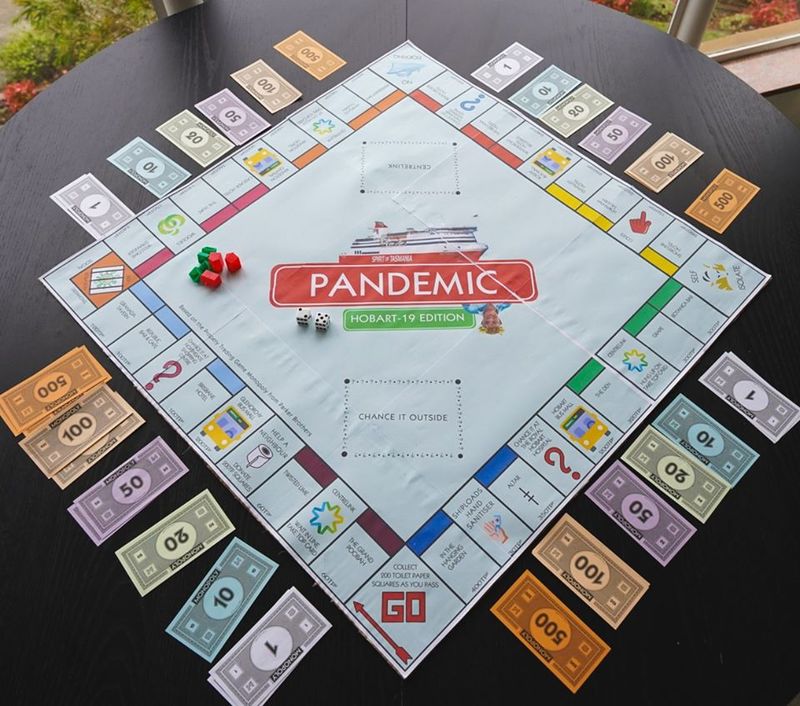 2020-03-29
2020-03-29Pandemic Monopoly
HUM 402 The image depicts the creation of Pandemic Monopoly by a Hobart resident. The homemade board game uses toilet paper as currency, referring to the toilet paper shortage seen across Tasmanian supermarkets. The board game presents players with the opportunity to 'own' key Hobart locations. However, instead of mortgage, houses and hotels, the game allows players to buy hospitals and clinics to place on the properties. Centrelink, the Australian governments social security service, features heavily on the board game, indicating the rise in unemployment due to the pandemic. Whilst being used for comical purposes, the game also critiques the Tasmanian governments early handling of Covid-19 crisis via a chance card, which states "You have a fever, dry cough and Pneumonia to boot but despite having all of the symptoms, you haven't knowingly come into contact with a known carried so they won't test you for Covid-19. The Royal Hobart Hospital sends you home. Get out of iso [isolation] free." This refers to the Tasmanian government in early stages of the Covid-19 pandemic refusing to test individuals who had not been in contact with a known case, or had not left the country. -
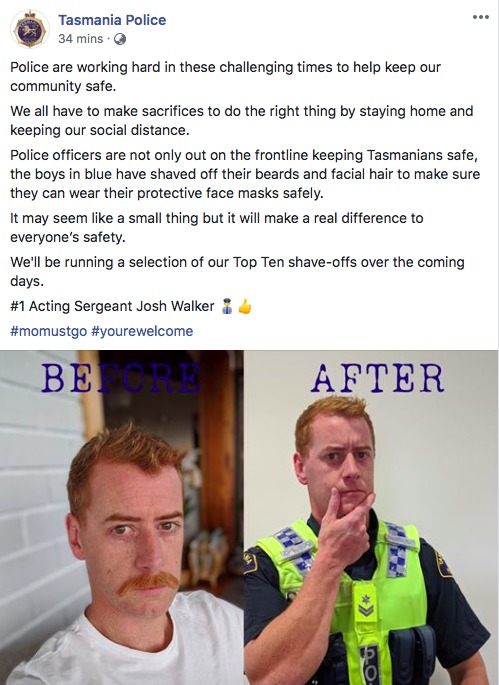 03/31/2020
03/31/2020Tasmania Police Top Ten shave-offs
HUM402 The image is a screenshot of the Tasmania Police Top Ten Shave Offs. This is one in a series of ten images which depict Tasmania Police Officers who have had to shave off their facial hair in order to wear protective personal equipment safely. -
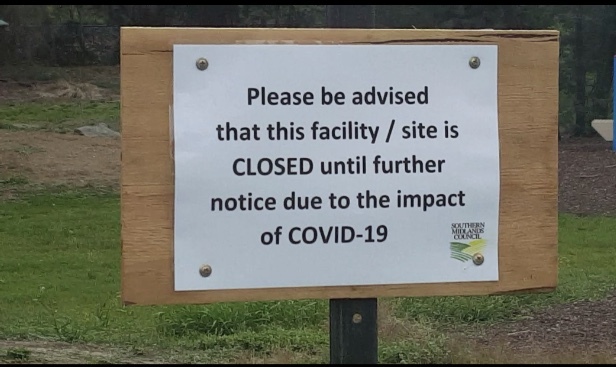 2020-02-05
2020-02-05Campania Park closed until further notice due to Covid-19
HUM402 The Government has closed all parks until further notice to help control the spread of Covid-19. -
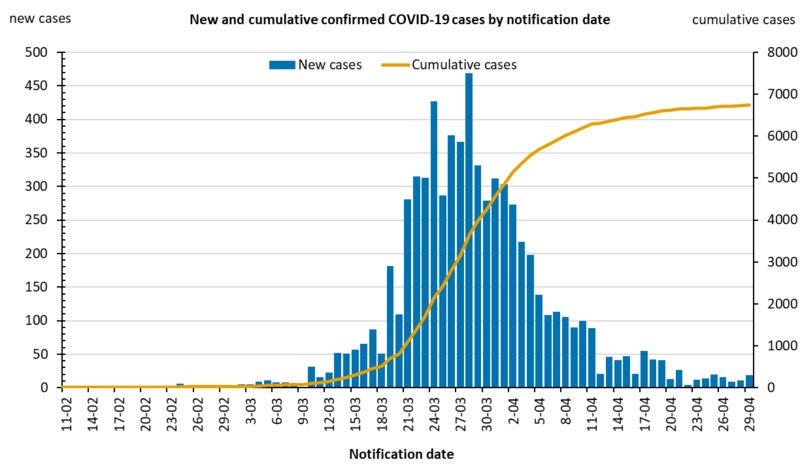 2020-04-29
2020-04-29Curve almost flattened. Australian Department of Health graph showing number of COVID-19 cases up until 29/4/20
Graph showing the new daily cases reported in Australia, showing peak cases and a flattening of the curve. -
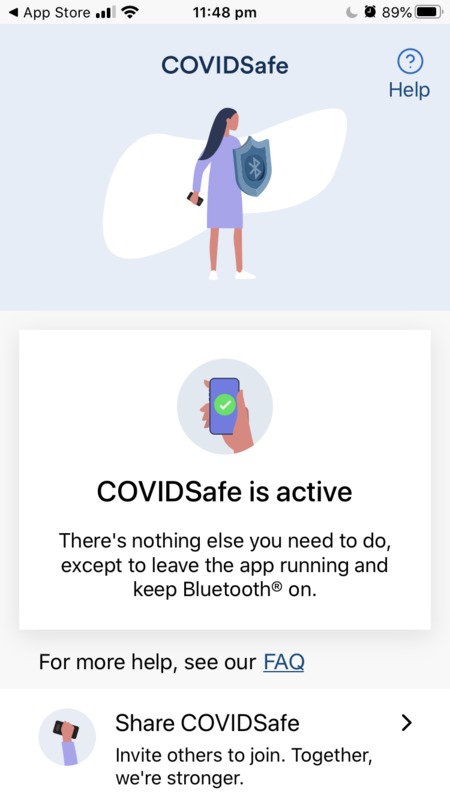 2020-04-26
2020-04-26COVIDSafe Phone App
Despite some concerns about privacy, the Australian Government has just launched the COVIDSafe app to help in contacting people exposed to coronavirus. Around a million people have downloaded the app n the first day -
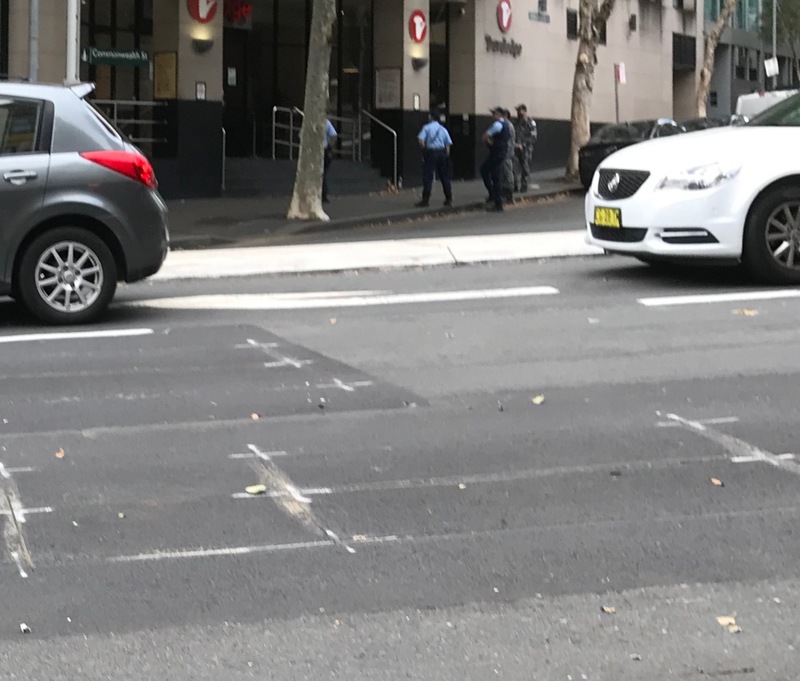 2020-04-06
2020-04-06Guarding the Travelodge
Police and Military personnel guard the Travelodge Hotel in Surry Hills, NSW, Australia. At the start of the lockdown due to COVID19, travellers returning to Australia were subject to mandatory quarantine for 14 days and were assigned hotels. They were isolated in rooms and police and army personnel guarded the premises around the clock. -
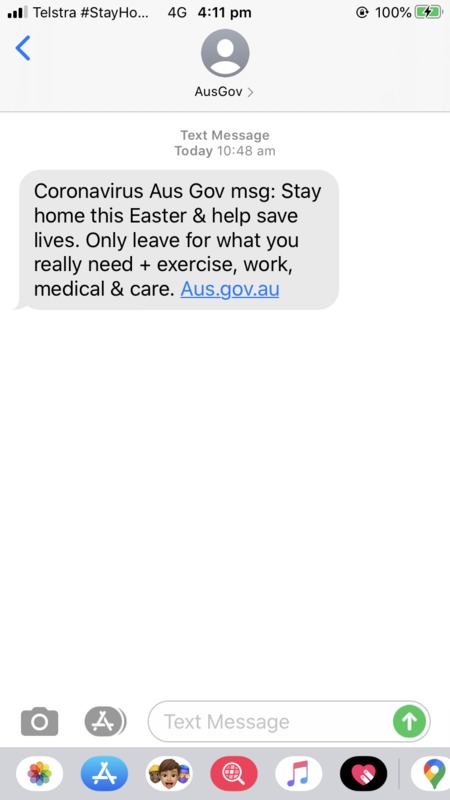 2020-04-08
2020-04-08Australian Government text message
HUM402 A text message received by Australian citizens from the Government, reinforcing social distancing measures across the 2020 Easter long weekend to help combat Covid - 19 -
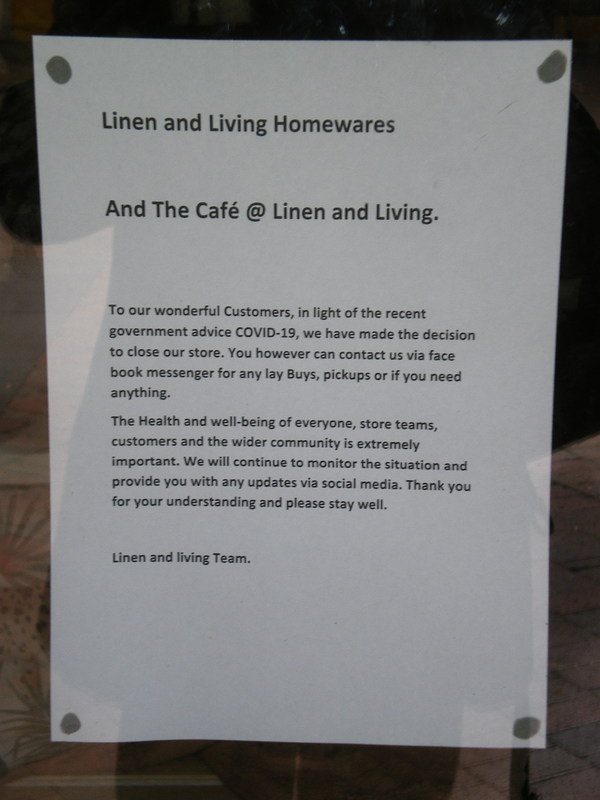 2020-04-21
2020-04-21Closed shop in Ballarat Linen and Living Homewares
Image of notice on closed business -
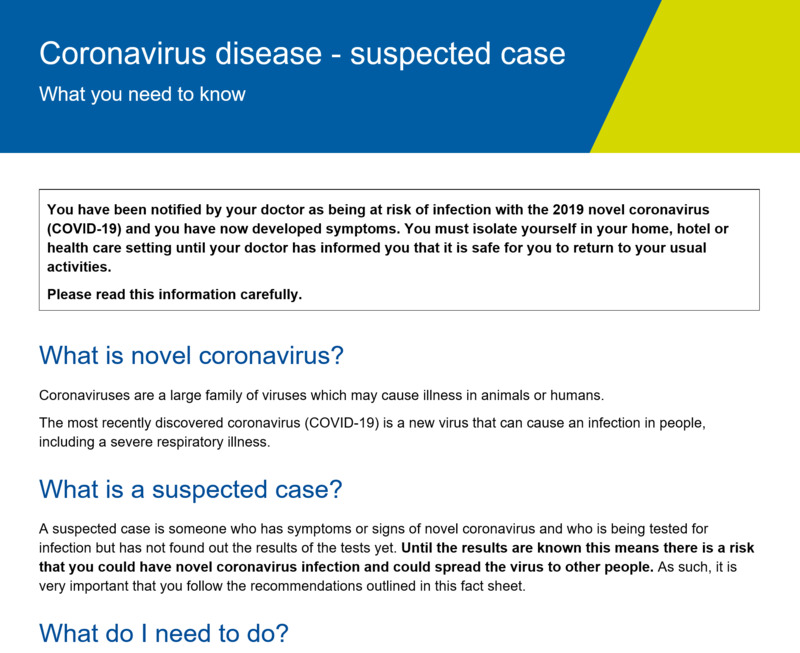 2020-02
2020-02Victorian State Government "Suspected Case" fact sheet
Government fact sheet for people who have been notified by their doctor as being at risk of infection and have now developed symptoms. You have been notified by your doctor as being at risk of infection with the 2019 novel coronavirus (COVID-19) and you have now developed symptoms. You must isolate yourself in your home, hotel or health care setting until your doctor has informed you that it is safe for you to return to your usual activities. Please read this information carefully. What is novel coronavirus? Coronaviruses are a large family of viruses which may cause illness in animals or humans. The most recently discovered coronavirus (COVID-19) is a new virus that can cause an infection in people, including a severe respiratory illness. What is a suspected case? A suspected case is someone who has symptoms or signs of novel coronavirus and who is being tested for infection but has not found out the results of the tests yet. Until the results are known this means there is a risk that you could have novel coronavirus infection and could spread the virus to other people. As such, it is very important that you follow the recommendations outlined in this fact sheet. What do I need to do? Your doctor will arrange for you to be tested for the infection. It may take a few days for the test results to be returned. If your symptoms are serious you will need to remain in hospital isolated from other patients to prevent further spread of the virus. If your doctor says you are well enough to return home while you are waiting for your test results you will need to stay isolated and monitor your symptoms as described below. Stay at home or in your hotel room • Isolate yourself at home until you are advised of the results by your doctor. – You should not leave your house except to seek medical attention. – You should stay in a different room to other people as much as possible. Use a separate bathroom if available. – Wear a surgical face mask when you are in the same room as another person and when seeking medical care. – Do not go to work, school, university, work or attend public places or events. Do not use public transport or taxi services. • Where possible, get others such as friends or family, who are not required to be isolated, to get food or other necessities for you. • If you have difficulties getting food or necessities, call 1800 675 398 for support. • If you need a translator first call 131 450, then request the hotline on 1800 675 398. More information is available on our website: dhhs.vic.gov.au/novelcoronavirus • Please keep Triple Zero (000) for emergencies only. Going outside If you live in a private house, then it is safe for you to go outside into your garden, balcony or courtyard. If you live in an apartment it is also safe for you to go outside into the garden while wearing a surgical mask. You should, however, go quickly through any common areas on the way to the garden. Wear a surgical mask if you have to move through these areas. Monitor your symptoms If your illness gets worse, you should call the doctor who cared for you or the emergency department where you were assessed. If it is a medical emergency (for example, shortness of breath at rest or difficulty breathing) you should: • Call 000 and request an ambulance • Inform the ambulance officers that you may have novel coronavirus, and they should take precautions. What happens if my test is negative? Your doctor or a Public Health Officer will advise you if you are can cease your isolation. If you were in self-isolation at the time you developed your symptoms, for example because you have been in contact with a confirmed case or travelled to China, you will need to continue isolation until the 14 days since last contact with the confirmed case or from your arrival in Australia. You should continue to carefully monitor your health for up to 14 days after your last contact with the confirmed case. Report any new or returning symptoms to your doctor in this period. You may be required to be tested again. You do not require medical clearance to return to work, university or school. If you have stayed in isolation and remain well, then they are safe to return to their usual activities. What happens if my test is positive? A Public Health Officer will contact you to find out more information from you and provide you with further information. You must remain in your home or accommodation until further tests are completed and you have become well. After a discussion, a specialist may be involved to further assess your illness. A Public Health Officer will conduct an assessment to advise when it is safe to return to normal activities. If your condition deteriorates, seek medical attention: • Notify the department or Public Health Officer managing your care by calling the number provided to you. • Follow the direction of the Public Health Officer who may advise you to go to a doctor or a hospital, and will agree with you how you should get there. • Call ahead to the doctor or hospital and inform them that you are a confirmed case of novel coronavirus. • If you need to leave your home or accommodation to seek medical attention, put on the mask provided to you. • When you arrive at the doctor’s surgery or hospital, tell them that you are a confirmed case of novel coronavirus. If you are experiencing severe symptoms, such as shortness of breath: • Call 000 and request an ambulance • Inform the ambulance officers that you have novel coronavirus. People who you have had close contact with including family members and people you live with will need to isolate themselves for 14 days since their last contact with you. Looking after your well-being during isolation Being confined to home for an extended period of time can cause stress and conflict. Tips for looking after yourself include: • Talk to the other members of the family about the infection. Understanding novel coronavirus will reduce anxiety. • Reassure young children using age-appropriate language. • Think about how you have coped with difficult situations in the past and reassure yourself that you will cope with this situation too. Remember that self-isolation won’t last for long. • Exercise regularly. Options could include exercise DVDs, dancing, floor exercises, yoga, walking around the backyard or using home exercise equipment, such as a stationary bicycle, if you have it. Exercise is a proven treatment for stress and depression. • Keep in touch with family members and friends via telephone, email or social media. • Keep up a normal daily routine as much as possible. • Arrange with your employer to work from home, if possible. • Ask your child’s school to supply assignments, work sheets and homework by post or email, or if the student can join the class using online options. • Don’t rely too heavily on the television and technology. Treat self-isolation as an opportunity to do some of those things you never usually have time for, such as board games, craft, drawing and reading. • If you are struggling to cope you call Lifeline on 13 11 14 or Beyond Blue on 1300 22 4636. Where can I find out more information? Call the Department of Health and Human Services on to discuss any questions you have. If you need a translator first call 131 450, then request the hotline on 1300 651 160. For Victorian updates to the current incident, go to: https://www.dhhs.vic.gov.au/novelcoronavirus For national updates: https://www.health.gov.au/news/latest-information-about-novel-coronavirus For international updates: https://www.who.int/westernpacific/emergencies/novel-coronavirus WHO resources https://www.who.int/health-topics/coronavirus -
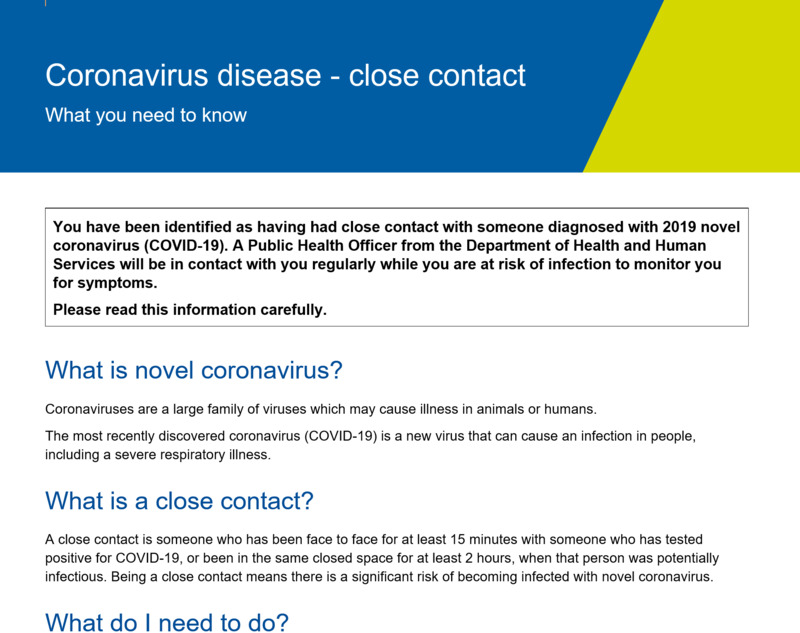 2020-02
2020-02Victorian State Government "Close Contact" fact sheet
Government fact sheet for people who "have been identified as having had close contact with someone diagnosed with 2019 novel coronavirus (COVID-19)", Version 1.3 You have been identified as having had close contact with someone diagnosed with 2019 novel coronavirus (COVID-19). A Public Health Officer from the Department of Health and Human Services will be in contact with you regularly while you are at risk of infection to monitor you for symptoms. Please read this information carefully. What is novel coronavirus? Coronaviruses are a large family of viruses which may cause illness in animals or humans. The most recently discovered coronavirus (COVID-19) is a new virus that can cause an infection in people, including a severe respiratory illness. What is a close contact? A close contact is someone who has been face to face for at least 15 minutes with someone who has tested positive for COVID-19, or been in the same closed space for at least 2 hours, when that person was potentially infectious. Being a close contact means there is a significant risk of becoming infected with novel coronavirus. What do I need to do? Stay at home or in your hotel room • Isolate yourself at home until 14 days after you were last exposed to the infectious person. – You should not leave your house except to seek medical attention. – You should stay in a different room to other people as much as possible. Use a separate bathroom if available. – Do not go to work, school, university, work or attend public places or events. Do not use public transport or taxi services. – Where possible, get others such as friends or family, who are not required to be isolated, to get food or other necessities for you. • If you have difficulties getting food or necessities, call 1800 675 398 for support. • If you need a translator first call 131 450, then request the hotline on 1800 675 398. More information is available on our website: dhhs.vic.gov.au/novelcoronavirus • Please keep Triple Zero (000) for emergencies only. Going outside If you live in a private house, then it is safe for you to go outside into your garden, balcony or courtyard. If you live in an apartment it is also safe for you to go outside into the garden while wearing a surgical mask. You should, however, go quickly through any common areas on the way to the garden. Wear a surgical mask if you have to move through these areas. Monitor your symptoms • Monitor your health until 14 days after you were last exposed to the infectious person. • Watch for any of these signs and symptoms: – fever – cough – shortness of breath • Other early symptoms can include chills, body aches, sore throat, headache, runny nose, muscle pain or diarrhoea. You will be contacted daily by a Public Health Officer to check whether you have had symptoms. What if I develop symptoms? If you develop any of the symptoms listed above: • Call a doctor or hospital and inform them that you have had contact with a confirmed case of novel coronavirus and you have symptoms. • Put on a mask if you have one. • Keep yourself away from others (for example, in a different room). • Do not go to work, school, university, work or attend public places or events. Do not use public transport or taxi services. • When you arrive at the general practice or hospital, tell them again that you are a contact of a confirmed case of novel coronavirus. Your doctor or staff at the hospital emergency department will ensure you are wearing a mask and take you through to a room away from others. The doctor will contact our department on 1300 651 160. They may organise to take nose and throat swabs to send for testing for the novel coronavirus. If you are experiencing severe symptoms, such as shortness of breath: • Call 000 and request an ambulance. • Inform the ambulance officers that you have been in close contact with a confirmed case of novel coronavirus. How can I prevent the spread of the virus? Practising good hand and sneeze/cough hygiene is the best defence: • Wash your hands often with soap and water before and after eating as well as after attending the toilet. • Avoid all contact with others. • Cough and sneeze into your elbow. Should I wear a face mask? Face masks are not recommended if you do not have symptoms. A facemask will not protect you against becoming infected. If you are ill, you should put on a mask if you have one to prevent spreading the infection to others. You will be given a mask to wear by your doctor. Looking after your well-being during isolation Being confined to home for an extended period of time can cause stress and conflict. Tips for looking after yourself include: • Talk to the other members of the family about the infection. Understanding novel coronavirus will reduce anxiety. • Reassure young children using age-appropriate language. • Think about how you have coped with difficult situations in the past and reassure yourself that you will cope with this situation too. Remember that self-isolation won’t last for long. • Exercise regularly. Options could include exercise DVDs, dancing, floor exercises, yoga, walking around the backyard or using home exercise equipment, such as a stationary bicycle, if you have it. Exercise is a proven treatment for stress. • Keep in touch with family members and friends via telephone, email or social media. • Keep up a normal daily routine as much as possible. • Arrange with your employer to work from home, if possible. • Ask your child’s school to supply assignments, work sheets and homework by post or email, or if the student can join the class using online options. • Don’t rely too heavily on the television and technology. Treat self-isolation as an opportunity to do some of those things you never usually have time for, such as board games, craft, drawing and reading. • If you are struggling to cope you call Lifeline on 13 11 14 or Beyond Blue on 1300 22 4636. Where can I find out more information? Call the Department of Health and Human Services on to discuss any questions you have. If you need a translator first call 131 450, then request the to be put through to the department on 1300 651 160. For Victorian updates to the current incident, go to: https://www.dhhs.vic.gov.au/novelcoronavirus For national updates: https://www.health.gov.au/news/latest-information-about-novel-coronavirus For international updates: https://www.who.int/westernpacific/emergencies/novel-coronavirus WHO resources https://www.who.int/health-topics/coronavirus -
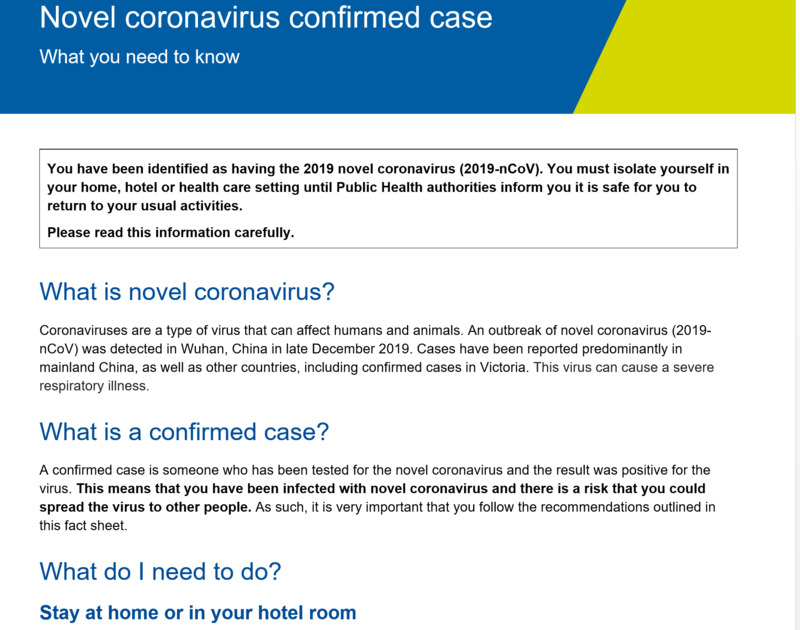 2020-02-11
2020-02-11Victorian State Government "Novel coronavirus confirmed case" fact sheet
Government advice to people who have "2019 novel coronavirus (2019-nCoV)". -
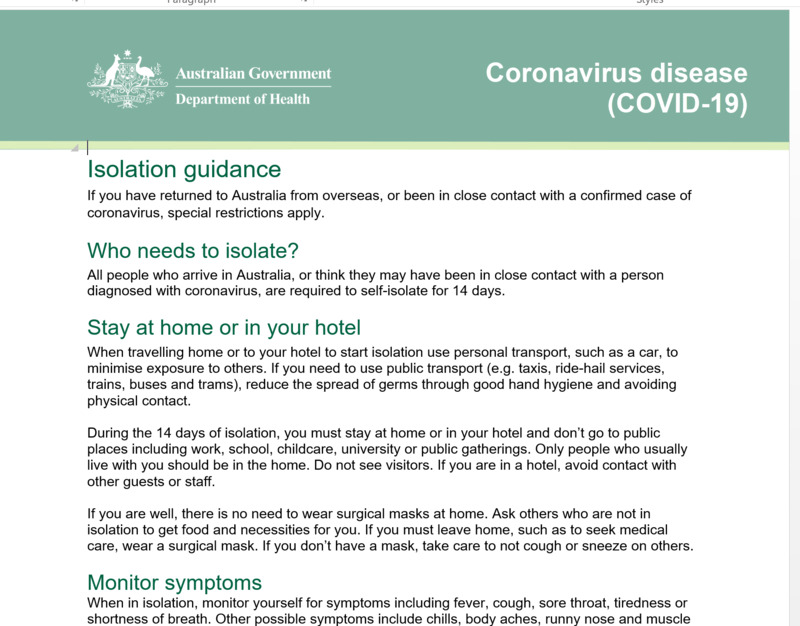 2020-03-23
2020-03-23Australian Government Isolation Guidance
Australian Government fact sheet with guidance on self-isolation, Version 14 Isolation guidance If you have returned to Australia from overseas, or been in close contact with a confirmed case of coronavirus, special restrictions apply. Who needs to isolate? All people who arrive in Australia, or think they may have been in close contact with a person diagnosed with coronavirus, are required to self-isolate for 14 days. Stay at home or in your hotel When travelling home or to your hotel to start isolation use personal transport, such as a car, to minimise exposure to others. If you need to use public transport (e.g. taxis, ride-hail services, trains, buses and trams), reduce the spread of germs through good hand hygiene and avoiding physical contact. During the 14 days of isolation, you must stay at home or in your hotel and don’t go to public places including work, school, childcare, university or public gatherings. Only people who usually live with you should be in the home. Do not see visitors. If you are in a hotel, avoid contact with other guests or staff. If you are well, there is no need to wear surgical masks at home. Ask others who are not in isolation to get food and necessities for you. If you must leave home, such as to seek medical care, wear a surgical mask. If you don’t have a mask, take care to not cough or sneeze on others. Monitor symptoms When in isolation, monitor yourself for symptoms including fever, cough, sore throat, tiredness or shortness of breath. Other possible symptoms include chills, body aches, runny nose and muscle pain. What do I do if I get sick? If you develop symptoms (fever, a cough, sore throat, tiredness or shortness of breath) within 14 days of returning to Australia, or within 14 days of last contact of a confirmed case, you should arrange to see a doctor for urgent assessment. You should telephone the health clinic or hospital before you arrive and tell them your travel history or that you have been in contact with a confirmed case of coronavirus. You must remain isolated either in your home, hotel or a healthcare setting until public health authorities inform you it is safe for you to return to your usual activities. How can I prevent the spread of coronavirus? Practising good hand and sneeze/cough hygiene and keeping your distance from others when you are sick is the best defence against most viruses. You should: • wash your hands frequently with soap and water, including before and after eating, and after going to the toilet • cover your cough and sneeze, dispose of tissues, and wash your hands • avoid contact with others (stay more than 1.5 metres from people) • stay at home if unwell. Going outside If you live in a private house, it is safe for you to go into your garden or courtyard. If you live in an apartment or are staying in a hotel, it is also safe for you to go into the garden but you should wear a surgical mask to minimise risk to others and move quickly through any common areas. Advice for others living with you Others that live with you are not required to be isolated unless they meet one of the isolation criteria outlined above. If you develop symptoms and are confirmed to have coronavirus, they will be classified as close contacts and will need to be isolated. Cleaning To minimise the spread of any germs you should regularly clean surfaces that are frequently touched such as door handles, light switches, kitchen and bathroom areas. Clean with household detergent or disinfectant. Managing the 14 day isolation Being in isolation can be stressful and boring. Suggestions include: • Keep in touch with family members and friends via telephone, email or social media. • Learn about coronavirus and talk with others. • Reassure young children using age-appropriate language. • Where possible, keep up normal daily routines, such as eating and exercise. • Arrange to work from home. • Ask your child’s school to supply assignments or homework by post or email. • Do things that help you relax and use isolation as an opportunity to do activities you don’t usually have time for. More information For the latest advice, information and resources, go to www.health.gov.au Call the National Coronavirus Helpline on 1800 020 080. It operates 24 hours a day, seven days a week. If you require translating or interpreting services, call 131 450. The phone number of your state or territory public health agency is available at www.health.gov.au/state-territory-contacts If you have concerns about your health, speak to your doctor. -
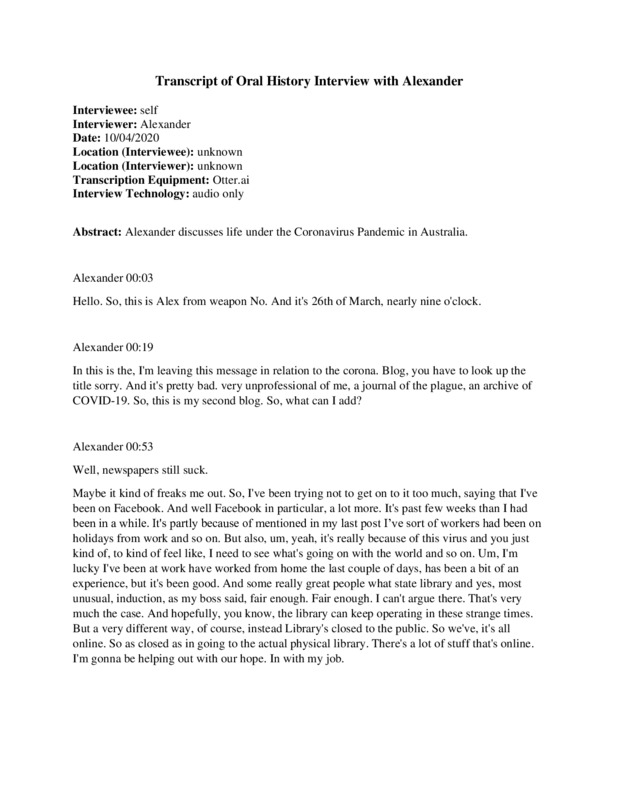 03/26/2020
03/26/2020Alexander Oral History, 2020/03/26
Rounding up what I've been doing since the first log I posted on March 24. There was a few things I felt like I didn't cover very well originally. -
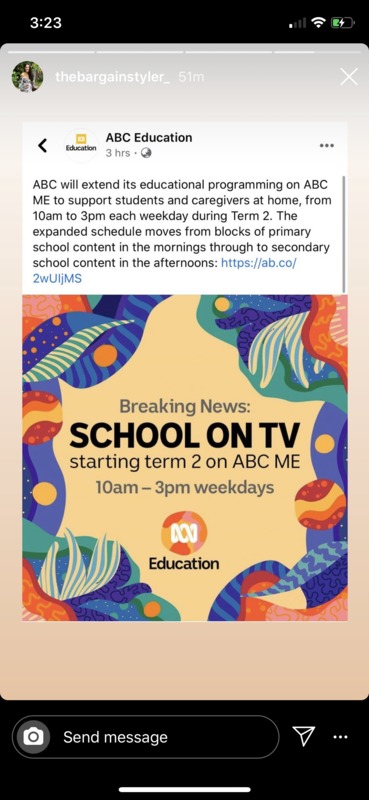 2020-04-02
2020-04-02ABC Education (Australia) announcement on Facebook about screening educational content.
A Facebook announcement from ABC Education (Australia) about screening educational content in term two. They will be screening primary school content in the morning and high school content in the afternoon. -
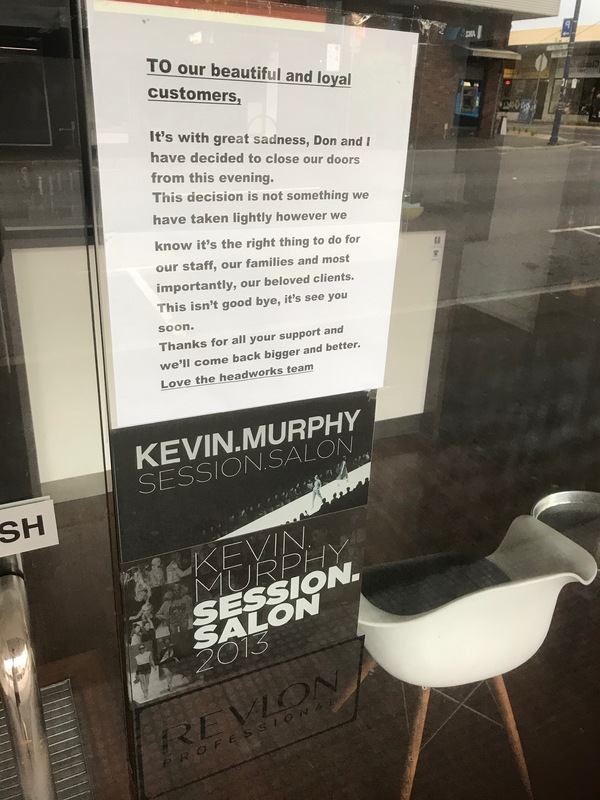 1 April 2020
1 April 2020Business closure
Many shops on Upper Heidelberg Road in Ivanhoe now closed for business. There was some controversy when government allowed hairdressing appointments of 30 minutes when other businesses were already being asked to reduce their services and social distancing was already de rigueur. -
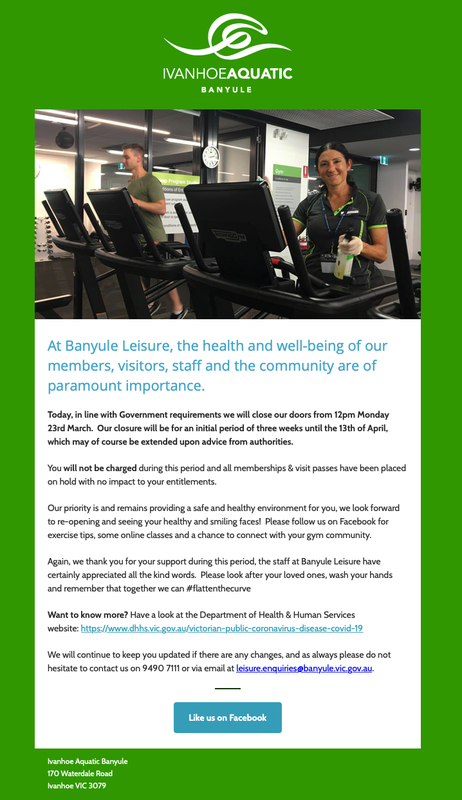 23 March 2020
23 March 2020Leisure centre closure
Announcement of leisure centre closure in line with Government requirements -
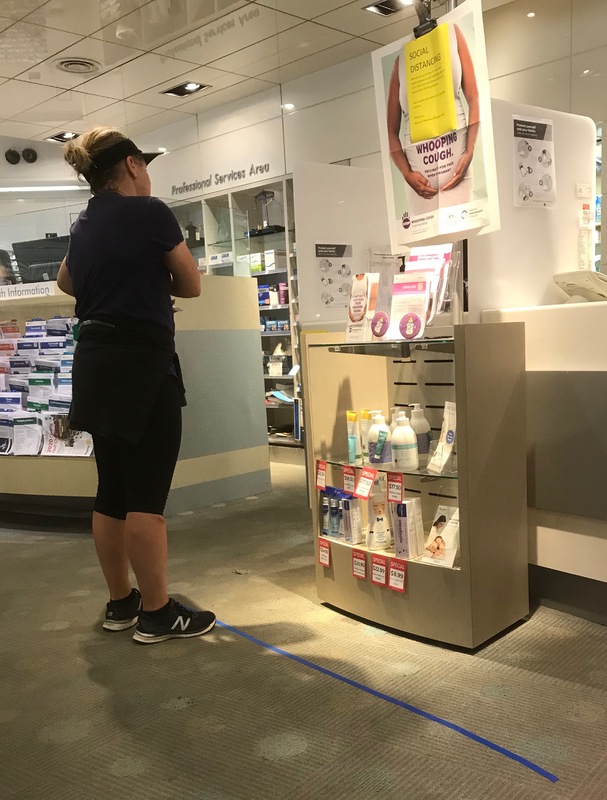 2020-03-28
2020-03-28The social distancing line
The Australian Government has recommended social distancing of at least 1.5 metres. This pharmacist has taped a line on the ground in front of their counters — it makes trying to reach forward to pay for goods a bit like a fairground game of "tap the card reader with your bankcard".
